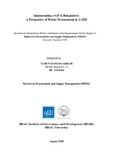Implementing e-GP in Bangladesh: a perspective of works procurement in LGED

View/
Date
2018-08Publisher
BRAC UniversityAuthor
Sarker, Tarun KumarMetadata
Show full item recordAbstract
E-procurement has drawn great attention and been adopted by increasing number of public
organizations. However, simply having an e-procurement system in place does not guarantee
that it will bring about benefits in term of improved procurement management. The system
must be measured and evaluated. The purpose of this study is to show the current scenario of
on-line (e-GP) works procurement and comparative scenario of on-line (e-GP) and off-line
(manual) works procurement in LGED. The research method was qualitative as well as
quantitative. Data used in this research was both primary and secondary. The on-line data was
retrieved from Procurement Management Information System (PROMIS) of LGED. On the
other hand, off-line data was collected from LGED’s procuring entities of all districts of
Bangladesh. Moreover, expert opinion questionnaire survey was conducted to collect the offline
data. The research reveals that average time requires of tender opening to issuing NOA
from FY 2011-12 to FY 2017-18 is 28 days which is much lower than that of PPR allowable
60-120 days. This is significant achievement in e-GP. This research also reveals that 100%
works procurement publish in CPTU website; average 6.5 numbers of tenderers purchase
tender documents, whereas average 4.7 numbers of tenderers submit tenders and average 4.6
numbers of tenderers are responsive. LGED higher authority delegates the financial power to
district/sub-district level officials and made things easier to complete the procurement
process in time or before time. 99.99% of tenders completed within initial tender validity
period. Percentage of tender procedure complaints reduced to 0.04% in FY 2017-18 from
0.32 at the beginning of e-GP in FY 2011-12. LGED implements about 46 % of total work
procurement in e-GP system. Efficiency of contract award is more than 80% of invitation for
tenders. Based on the findings, the study came up with the following recommendations:
implementation of electronic Contract Management System (e-CMS) is required as soon as
possible to make efficient tendering process success by proper contract management;
imposing procurement act/rule strictly in tendering process as well as e-CMS is essential so
as to bring the benefit of transparent procurement. Overall, this research facilitates policy
makers, enforcement agencies and researchers in understanding how to implement 100
percent e-procurement of works efficiently and effectively.
